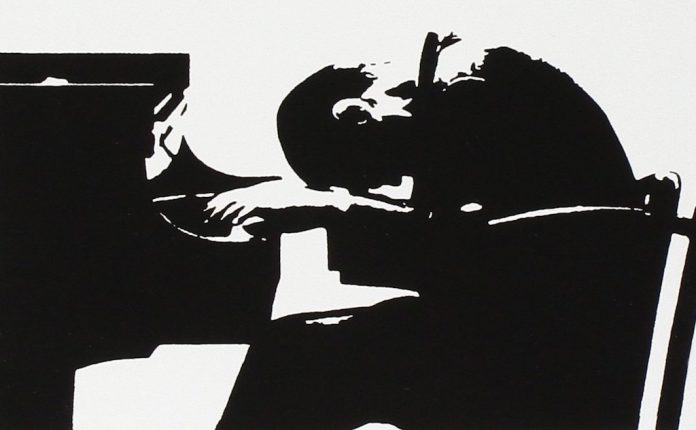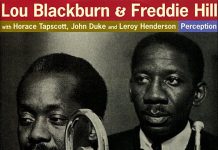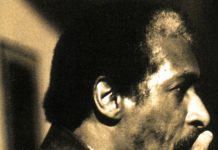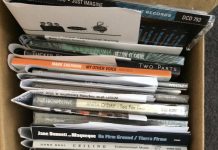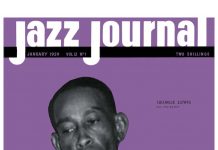Tinnitus, the Times headline shouted, can affect mental health. And this is news? As with so much else in the dead-tree press these days, the story was a mix of shaky science and the blindingly bleeding obvious, but I predict that once “bad back” and “stress” lose their conviction on absence notes, tinnitus will be the next big thing in the workplace. I said TINNITUS WILL BE…
Jazz isn’t a quiet music at the best of times, but there’s always been a distinction between it and “loud” rock, and the whole post-rock aesthetic has been built around noise. How loudly do you play your jazz records? As loudly as you’d play Cream or Rory Gallagher? As loudly as you’d play Sibelius or Brahms? I realised this week, only because an outsider commented, that I play my music very loudly indeed. Having lived mostly in remote rural places for most of my life – with a period in London when I had to be more circumspect – I can play things at top volume content in the knowledge that I’m not going to have the Noise Abatement Society (do they still exist? how depressed they must be) on my case.
But is it the right way to listen to our music? It’s one thing to enjoy noise-oriented music in the right contexts. I remember staggering out of a Grand Funk Railroad gig with my ears ringing and the morning after a night with Jesus and Mary Chain when I had to learn to lip-read pretty damn quick, and then there was a Dror Feiler gig at the Huddersfield Contemporary Music Festival that needed ear-plugs and my hood up (they wouldn’t let my son in at all, but he was small). The odd thing is, though, that whatever the decibel meter says, my perception is that large, acoustic orchestras and big bands sound louder than any amplified music. The Ted Heath band in its heyday apparently sounded like a jet taking off and Sun Ra in Paris – must have been late 70s – was an intergalactic battering, like a meteor shower of sound.
It wasn’t the loudness of rock per se that damaged so many players’ hearing. It was listening to playbacks on cans. Pete Townshend told me that. I said I was sorry to hear it. ‘A quarter past three’, he replied, looking puzzled
That’s one thing, but I found myself last week putting on Bill Evans at the Vanguard. Work-related listening, for a chapter on Gavin Bryars, who was profoundly influenced by Evans’ trios. And I was aware, because there were people round the house, reacting, that I was playing it very loud indeed. That’s how I seem to hear the overtones and it’s certainly how I most enjoy the music. There are so many obvious retorts and responses to this, but they’re easily headed off. Am I getting deaf? The truth is that my last audiology test (a habit begun at the BBC and continued since – I have a morbid fear of losing my hearing) confirmed that I can hear the grass grow, and I still have the disconcerting ability to earwig conversations at the far end of the table while maintaining one at my end. So deafness is not an issue. Playing music loud is an aesthetic choice. Couldn’t I, for the sake of others, listen to music on headphones? No way. It wasn’t the loudness of rock per se that damaged so many players’ hearing. It was listening to playbacks on cans. Pete Townshend told me that. I said I was sorry to hear it. “A quarter past three”, he replied, looking puzzled.
So no deafness, no headphones, no real understanding why volume should be such a compelling sensation. When Charlie Haden and a version of the Liberation Music Orchestra played the Astoria in London – never a regular venue for jazz, but that’s where he was booked – some guy down the front kept shouting “Louder, louder”. Charlie, who was a gentle guy until pushed, immediately got the sound guy to crank the volume down and kept making sotto gestures to his players. I thought the energy went out of it. Is there a sound more exhilarating than massed brasses and reeds irradiating you with overtones? Or the blare of a saxophone when your table is just inches away from the stand? There’s a well-established tradition of playing loud to drown out conversation or sarcastically apologising to the front row for disturbing their chat, but I reckon we ought to experiment more with volume. Tinnitus may, duh, be bad for your mental health. It must be a pretty wretched thing. I have a faint whistle on stressy days, which I put down to high blood pressure, but it’s not much more than a natural ambient sound. And I like quiet music and quiet places. I live in one. I adore a string quartet of Luigi Nono’s that has practically no sound in it at all. And I go on retreat every year and don’t speak to anyone for three days beyond muttering the responses. Youngsters are so risk-averse now that student unions have probably banned loud music on campus (and that’s me denied a platform now for stereotyping the chronology-deficient as “young” … and not mentioning any loud women: Suzi Quatro, Maggie Bell, Dinah Washington…) but I think it’s worth experimenting with.
I’m playing Charlie Parker at the moment on the big speakers and the vod … water in my glass is trembling in a pleasingly Jurassic Park way. But the sound is tremendous, easily this side of distortion even from a recording made 70 years ago, and every single detail of the sound is evident. Yesterday, also work-related, it was a bunch of Chris Barber Black Lions from the 70s, fantastic when played full blast. It’s the difference between looking at a small painting across a room or being able to inspect it close to and seeing the brushstrokes and the artist’s partials where he’d touched the canvas. Maybe there’s a better index of ageing than thinning hair, snaggling teeth, diminished desire, forgetfulness. When was the last time someone banged on your wall and told you to turn that bloody rubbish down?

